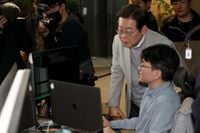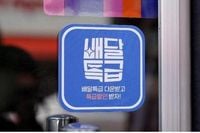In a bold move that could reshape South Korea's technological landscape, Democratic Party presidential candidate Lee Jae-myung has pledged to invest a staggering 100 trillion won (approximately $70 billion) in artificial intelligence (AI) if elected president. This announcement, made on April 14, 2025, marks Lee's first significant policy commitment since declaring his candidacy on April 10.
Lee's ambitious plan aims to position South Korea as a leader in the AI sector, with the government acting as a catalyst for private investment. According to a campaign official, the government anticipates around 65 trillion won in private investment in AI over the coming years, with the goal of raising a total of 100 trillion won through a combination of public funding and private contributions over a five-year term.
"AI is no longer optional, but essential," Lee stated in a Facebook post, underlining the urgency of his vision. He has outlined several key initiatives, including the establishment of national AI data clusters, securing graphics processing units (GPUs), and developing neural processing units (NPUs) to bolster South Korea's technological sovereignty.
Additionally, Lee plans to launch a global AI co-investment fund and create AI departments at regional universities. He also aims to attract top AI talent by offering military service exemptions and easing regulations related to AI development. One of his most ambitious proposals is to develop a Korean version of ChatGPT, which he envisions as being freely available to the public, promoting his vision of "AI for All."
During his visit to FuriosaAI, a leading fabless company in the NPU sector, Lee emphasized the need for strong government leadership in AI development. "I will examine how the nation can prepare for the AI era," he remarked during a roundtable discussion with company officials. FuriosaAI CEO June Paik echoed this sentiment, stating that robust government involvement is crucial in areas such as capital investment, talent recruitment, and infrastructure development.
Lee’s commitment to AI investment is not entirely new; as Gyeonggi governor in 2020, he established a dedicated AI Industry Strategy Office, demonstrating his long-standing interest in the sector. His core AI policy advisers include Park Tae-woong, head of the Center for Collective Intelligence at The Institute for Democracy, and Professor Zhang Byoung-tak from the Interdisciplinary Program in Artificial Intelligence at Seoul National University.
However, Lee's ambitious AI plans have not gone without criticism. Ahn Cheol Soo, a lawmaker from the opposition People's Power party, questioned the feasibility of Lee's vision, stating, "Is it another 'K-NVIDIA Season 2'?" Ahn criticized Lee's pledge to provide free access to a Korean ChatGPT for all citizens, suggesting that it reflects a lack of understanding of the complexities of AI.
Ahn pointed to Lee's previous initiatives, such as the "Gyeonggi-do Public Delivery App," which he claimed failed due to low competitiveness and usability issues. "Public apps in Gyeonggi Province have become 'cold rice' due to their uncomfortable use and low competitiveness," Ahn remarked, highlighting the challenges faced in implementing government-led technology projects.
In response to Lee's claim that AI could promote a better work-life balance by reducing working hours, Ahn argued that while AI creates new jobs, it can also lead to job losses. He emphasized the need for structural reforms to accompany the changes brought about by AI, stating, "AI is an opportunity and a threat, and change itself." Ahn further elaborated that the AI era must be accompanied by a model that allows AI to work alongside humans rather than replacing them.
Lee's vision also includes the creation of what he calls an "AI sovereign wealth fund" that aims to support the growth of a domestic tech champion similar to Nvidia, which he refers to as "K-Nvidia." He believes that the wealth generated from AI should be distributed widely among the public, creating what he terms an "AI-based welfare society." This vision aligns with his broader goal of ensuring that the benefits of AI technology are accessible to all citizens.
On the same day as his AI investment announcement, Lee published a book titled "The People Make It Happen in the End." In the book, he reflects on his experiences during the martial law declaration in December 2024, recalling how he quickly reached out to influential media figures to disseminate information. Lee described his initial reaction to hearing about the martial law as disbelief, stating, "This is deepfake, fake news," before realizing the situation's gravity.
Lee's narrative in the book offers insight into his approach to leadership and communication, emphasizing the importance of quick and effective information dissemination in times of crisis. He noted that he had been convinced of the likelihood of martial law even before the April 2024 general election, citing early warning signs during the National Assembly confirmation hearing of Labor Minister Kim Moon-soo.
As the presidential race heats up, Lee Jae-myung's commitment to AI investment and his broader vision for technological advancement will likely be key points of discussion among voters. His proposals have sparked both enthusiasm and skepticism, reflecting the complex landscape of AI development in South Korea.
With the election approaching, it remains to be seen how Lee's plans will resonate with the electorate and whether they will translate into actionable policies that can effectively harness the potential of AI for the benefit of all South Koreans.


